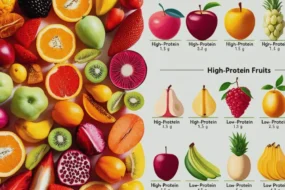
An unhealthy relationship with food can feel like a constant battle—whether it’s guilt after eating, stress over food choices, or feeling out of control around certain foods.
These struggles are more common than you might think, and they can take a toll on both your mental and physical health. The good news? Identifying the signs is the first step toward recovery.
In this article, we’ll explore what an unhealthy relationship with food looks like, its impact on your well-being, and practical steps to help you build a healthier, more balanced approach to eating. Let’s start this journey toward food freedom together.
Signs of an Unhealthy Relationship with Food
Emotional eating, binge eating, or restrictive habits, along with guilt, anxiety, or obsession over food choices, are key signs. Physical symptoms like weight fluctuations or low energy may also indicate a strained connection with food.
What Does a Healthy Relationship with Food Look Like?
A healthy relationship with food means enjoying meals without guilt, listening to your body’s hunger and fullness cues, and viewing food as nourishment rather than a source of stress.
It’s about balance—eating for pleasure and health, without strict rules or labels like “good” or “bad.” Having a positive connection with food supports your mental and physical well-being, allowing you to live freely and confidently.
Understanding this balance is key to recognizing when your relationship with food might need a little extra care, whether you’re practicing mindful eating or exploring approaches like a 96-hour Fast that align with your body’s needs.
Signs of an Unhealthy Relationship with Food
- Recognizing the signs of an unhealthy relationship with food is the first step toward change.
- Emotionally, you might use food to cope with stress, sadness, or boredom, often feeling guilty afterward.
- Behaviorally, you may binge eat, restrict certain foods, or obsess over calories.
- Psychologically, anxiety around meals, fear of certain foods, or negative body image can dominate your thoughts.
- Physically, you might experience weight fluctuations, low energy, or digestive issues.
If any of these resonate with you, know that you’re not alone and that healing is possible. One powerful tool for creating a healthier mindset is practicing Affirmations for Healthy Eating, which can shift your focus from guilt and restriction to nourishment and balance. Let’s explore how to take the next steps together.
Common Causes of an Unhealthy Relationship with Food
An unhealthy relationship with food often stems from diet culture, which promotes strict rules and labels foods as “good” or “bad.” Trauma or mental health struggles, such as anxiety or depression, can also play a role.
For example, some people turn to food for comfort, while others restrict it to feel in control. Even small habits, like wondering if Diet Coke can go bad or obsessing over expiration dates, can signal deeper food-related anxieties.
External factors, such as societal pressure or emotional eating, often contribute to these struggles. By understanding these causes, you can address the root of the issue and move toward a healthier, more balanced approach to eating.
Impact on Mental and Physical Health
An unhealthy relationship with food can deeply affect your mental and physical health. Mentally, it may lead to food guilt, anxiety around meals, or a constant preoccupation with eating habits.
Physically, it can cause weight fluctuations, low energy, or digestive issues. Over time, these struggles can erode your self-esteem and overall well-being.
For example, binge eating or restrictive eating can disrupt your body’s natural balance, while emotional eating may leave you feeling trapped in a cycle of shame. Recognizing these impacts is crucial to breaking free and building a healthier, more positive connection with food.
How to Develop a Healthy Relationship with Food
Building a healthy relationship with food starts with letting go of strict rules and embracing balance. Stop dieting and focus on nourishing your body without guilt. Practice intuitive eating by listening to your hunger and fullness cues, and allow yourself to enjoy all foods without labeling them as “good” or “bad.”
If you struggle with emotional eating, explore alternative coping mechanisms like journaling or talking to a friend. For deeper issues, consider seeking help from a therapist or dietitian. Remember, healing takes time, but every small step toward food freedom is a victory worth celebrating.
The Role of Social Media and Diet Culture
Social media and diet culture often promote unrealistic standards, making maintaining a healthy relationship with food harder. Platforms are flooded with “perfect” meals, fitness trends, and weight-loss ads, which can fuel food anxiety and body image issues.
To combat this, curate your feed by following accounts that promote intuitive eating and body positivity. Unfollow those that trigger food guilt or unrealistic expectations. Keep in mind, what you see online isn’t always the truth.
By creating a healthier digital environment, you can protect your mental health and focus on building a balanced, joyful connection with food.
How to Support a Loved One Struggling with Food
If someone you care about shows signs of an unhealthy relationship with food, such as binge eating, food guilt, or avoiding social meals, approach them with kindness and understanding. Avoid judgmental language and instead offer a listening ear. Please encourage them to explore intuitive eating or seek professional help, such as a therapist or dietitian.
Share resources about food freedom and healthy eating habits, but let them take the lead in their journey. Your support can make a world of difference as they work toward building a healthier, more positive connection with food.
FAQ’s
Q: How Do You Know if Food is Unhealthy?
To spot unhealthy foods, read labels closely—avoid items high in saturated fats, sodium, or added sugars. Plan snacks and meals at home using whole, fresh foods like fruits, vegetables, lean meats, fish, and plant-based proteins.
Q: How Can I Tell if I’m Unhealthy?
Look out for signs of poor health, like snoring, feeling tired, or feeling gassy. Other clues include skin that isn’t clear, whites of your eyes that aren’t white, urine that isn’t pale straw, or toenails and fingernails with an odd colour or texture.
Q: Do I Have a Disordered Relationship with Food?
Signs of a disordered relationship with food include spending too much time thinking about food, worrying constantly about weight or body shape, and avoiding social situations. Other warning signs are eating very little, making yourself sick, or taking laxatives after meals.
Conclusion
Recognizing the signs of an unhealthy relationship with food is the first step toward healing. Whether it’s binge eating, food guilt, or emotional eating, you’re not alone—and help is available.
You can build a healthier, more balanced connection with food by practicing intuitive eating, letting go of strict rules, and seeking support. Food freedom is about nourishing your body and soul without shame or stress.
Take small steps, be patient with yourself, and celebrate every victory. Your journey to a positive relationship with food starts today—you’ve got this!
I’m Ayesha Zahid, a certified Nutritionist and Dietitian with over 3 years of hands-on experience helping individuals and families improve their health through nutrition.



